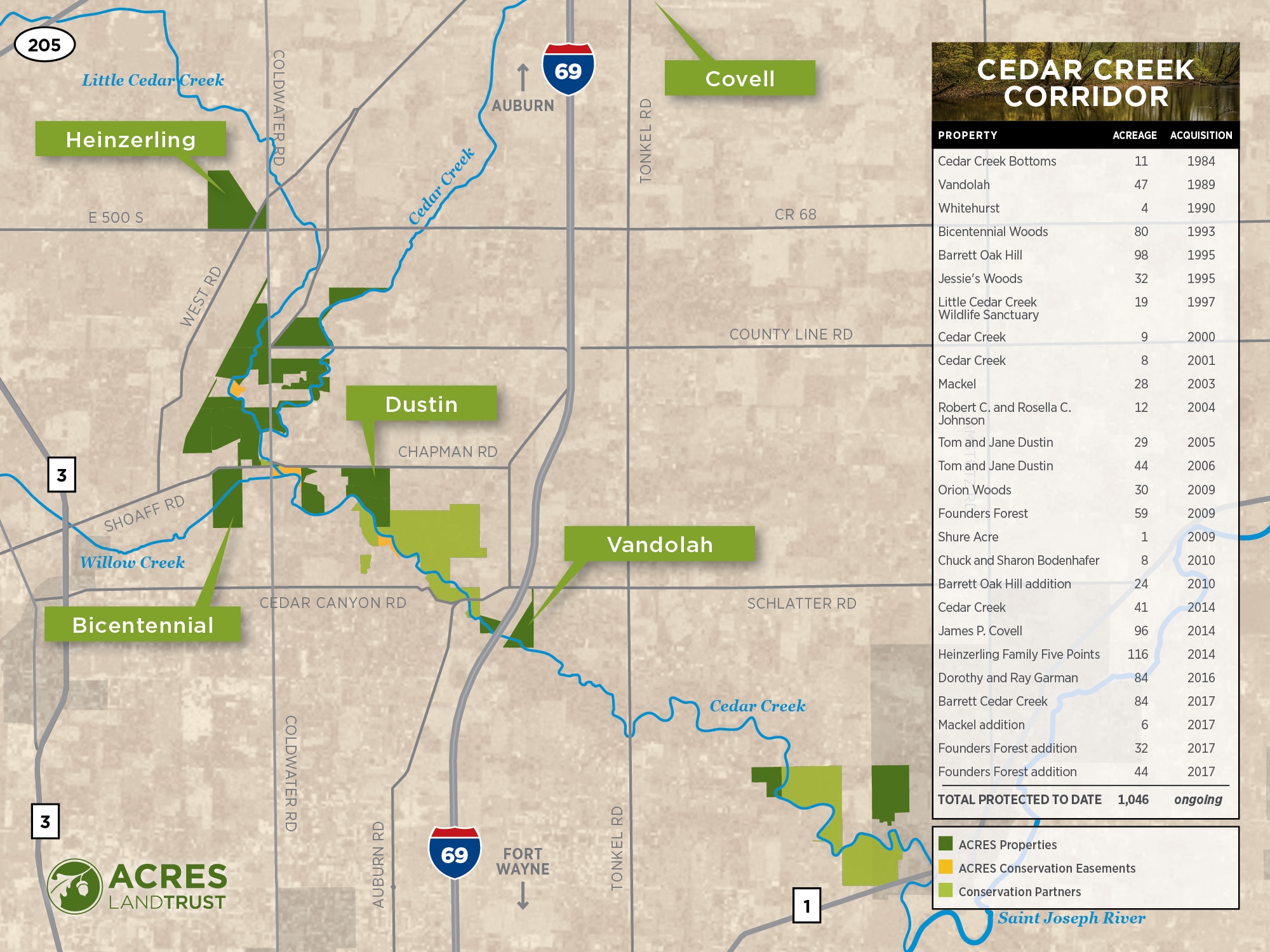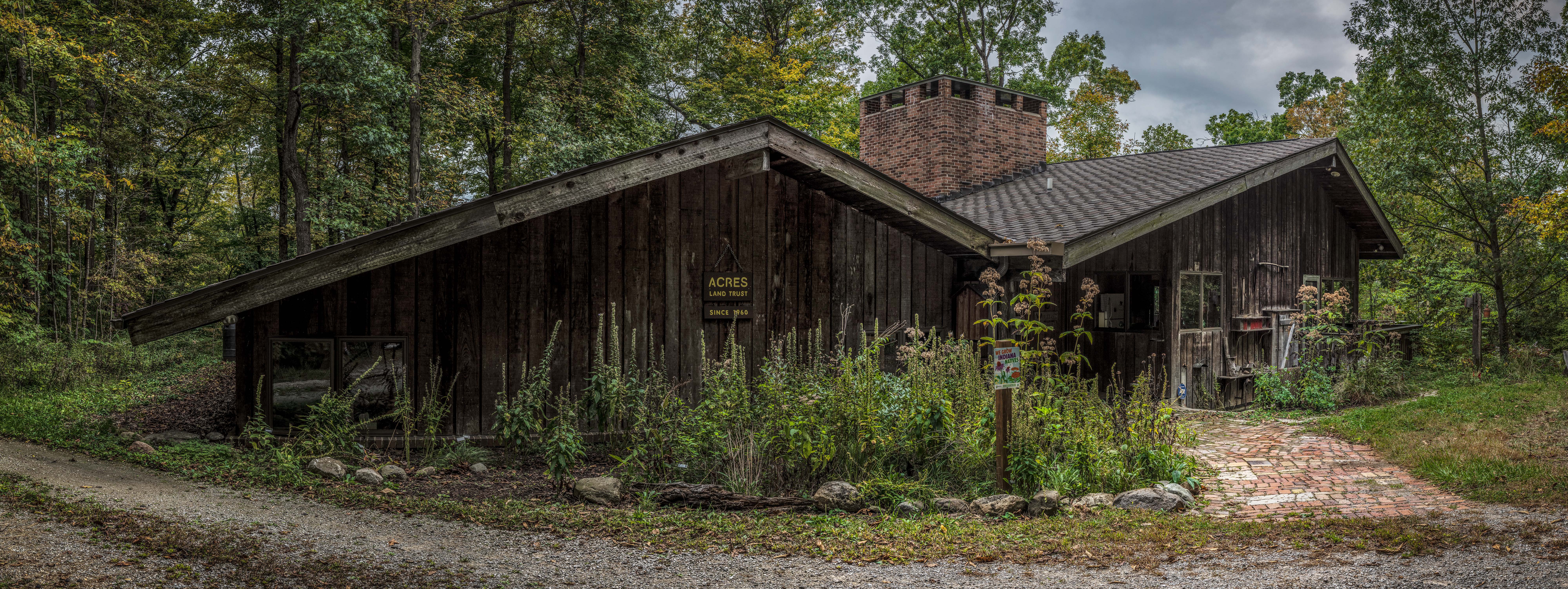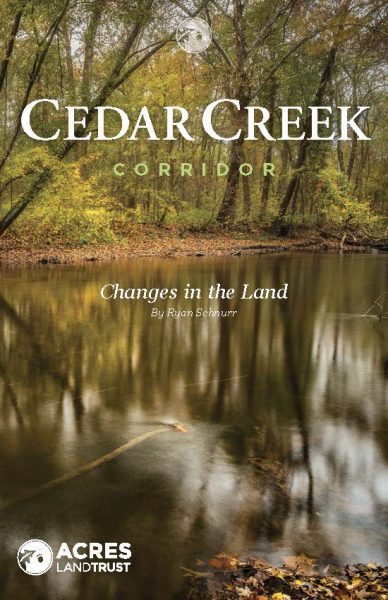About ACRES & Cedar Creek
To date, with the support of our members, ACRES Land Trust permanently protects over 1,000 acres within the Cedar Creek Corridor, north of Fort Wayne. ACRES’ name will always be on the deed for this land; it will never be sold, transferred or developed. Our partners protect an additional 500 acres.
Over decades, as families and neighbors recognized the value of their land here, they entrusted this living legacy with ACRES. This place tells the story of what’s possible when a community comes together to protect land.
There’s so much more to do. On Cedar Creek and beyond. Will you join us?

Recently protected Cedar Creek properties
Get to know Cedar Creek
“We only defend what we love, and we only love what we know. Learning to know a place, whether a backyard or a watershed . . . is an endless challenge, therefore an endless source of delight.”
– Scott Russell Sanders, Wild & Scenic Indiana
To know Cedar Creek, ACRES invites you to spend time here. Walk, sit, volunteer, join an outing, return often, in all seasons.

About ACRES Land Trust
Founded in 1960 by twelve people who each pitched in $5, ACRES Land Trust is Indiana’s oldest and largest nonprofit land trust. ACRES permanently protects more than 7,000 acres on over 100 properties in the tristate area. You can explore ACRES preserves on 56 trail systems from dawn to dusk, daily, at no charge thanks to support from our members.
ACRES offers hikes, concerts and unique outings to celebrate our community of support and welcome new members. Our organization is growing at a phenomenal pace – and you can help. With your participation, we will protect more of the places people love, right here at home.
Would you like to know more about ACRES?
These buttons will take you to our website where you can explore our news, find our preserve trails and see how you can participate. Many thanks – and happy trails!
About Cedar Creek
-
“If you look at any era of aerial photos starting in 1938 to present, this forested corridor jumps out at you. There’s nothing else like it.”
 Tony Fleming, Geologist and ACRES member
Tony Fleming, Geologist and ACRES member -
“Because there’s such a large tract of natural area, what we’re seeing is a functional forest, which means that there’s a lot of things that live here that need big areas of land to roam. So you’ll see bobcats, nesting Bald Eagles, Pileated woodpeckers …”
 Jason Kissel, ACRES Executive Director
Jason Kissel, ACRES Executive Director -
“There’s something about going out and you never know what you’re going to see. I get choked up about it. You can’t put a price on a wildflower. … I didn’t really understand the value of the floodplains.”
 Carol Roberts, ACRES Board Member, Cedar Creek resident
Carol Roberts, ACRES Board Member, Cedar Creek resident -
“The Cedar Creek Corridor actually has quite a bit of complexity in regards to habitat type. We’re in forested floodplain; upstream there’s a fen which is a pretty unique kind of wetland. There are some emergent wetlands and there are a handful of gravel hill prairies …”
 Casey Jones, ACRES Director of Land Management
Casey Jones, ACRES Director of Land Management

Buy the booklet | Cedar Creek Corridor: Changes in the Land by local author Ryan Schnurr
“Imagine, for a moment, you’re suspended high above Allen County, Indiana—maybe you’re in an airplane, or maybe you’re hovering digitally. Looking toward the earth, trace your eyes northeast from downtown Fort Wayne, ten miles or so, along the St. Joseph River, and hang a left—to the northwest—at the mouth of Cedar Creek. Almost immediately the landscape changes: most obviously, there are many, many more trees. The ground is steeper too, and the flora shifts, but you probably don’t notice. From above, you see only a wooly-green swath of land following the creek upstream, from Leo-Cedarville to beyond North County Line Road. This dark crowd of vegetation represents the most significant tract of undeveloped land in Allen County: The Cedar Creek Corridor.”



